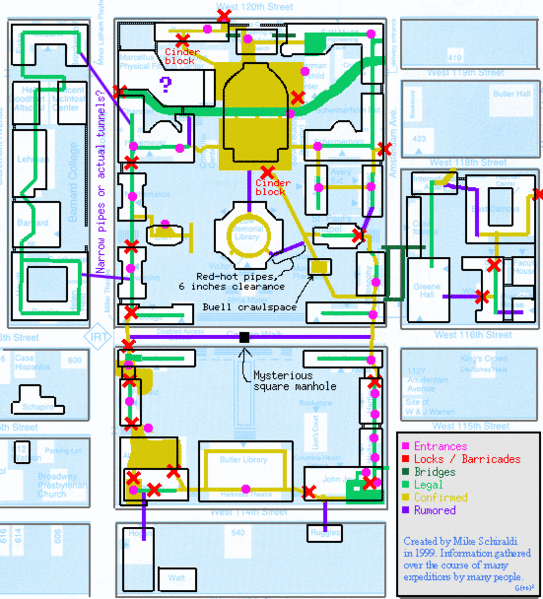Last-Minute NYC Holiday Gift Guide 🎁
We’ve created a holiday gift guide with presents for the intrepid New Yorker that should arrive just in time—


What is now possibly the worst kept secret at Columbia’s Morningside campus, an intricate network of tunnels connects many of the school’s buildings. The history however, is still fascinating. These tunnels date back to 1900 when the campus was home to another institution: Bloomingdale’s Insane Asylum. The only remnants of this asylum that exist on Columbia’s campus are these underground tunnels and Buell Hall which was an original structure from Bloomingdale’s. The tunnels are still in use today, though the university is increasingly limiting access due to rogue tunnel explorers and other hazards, many of which are remains from another famous use for the tunnels: the Manhattan Project.

This map created by Mike Schiraldi seems to be the only reliable map online, but it is from 1999 via Columbia University Wiki
A few maps of these windings passageways are available online, but it seems that local explorers keep hushed about the tunnels in order to prevent outsiders. This video by David Xia shows the dark and damp conditions of the tunnels, but also explains some of the appeal to the students at Columbia University. The walls are scrawled with graffiti that ranges from molecular structures, Latin quotes, poetry, Bible passages, to pop culture references.
The tunnel system has its own page on the Columbia University wiki! There are some hints also written on the walls: directions on how to get out, as well as this advice from Ben Wheeler: “If you find yourself in an asbestos shaft between certain of the north campus buildings and you find some graffiti that says ‘for God’s sake don’t look around this corner,’ don’t look around the corner.” The tunnels are also a draw for photographers and performance artists such as Miru Kim, a Columbia graduate whose photo series Naked City Spleen emphasizes the contrast between the human form and the man-made industrial structures that surround us.
Have a quirky find you want us to publish in the Daily What?!? Contact us or submit via Twitter with the hashtag #DailyWhat.
Subscribe to our newsletter